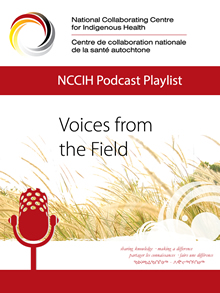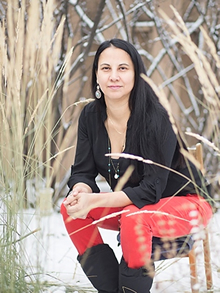 NCCAH Voices from the Field Podcasts
NCCAH Voices from the Field Podcasts
Voices from the Field
Welcome to Voices from the Field, a podcast series produced by the National Collaborating Centre for Aboriginal Health (NCCAH), which focuses on innovative research and community-based initiatives promoting the health and well-being of First Nation, Inuit and Métis peoples in Canada.
Episode 1: Nehiyawak Land and Language Camp - Revitalizing Indigenous languages for health and well-being
This episode looks at the Nehiyawak Land and Language Camp, a week-long land-based Cree immersion program in Saskatchewan. This camp was developed by Cree scholar and second-language learner, Belinda Daniels. Now in its twelfth consecutive year, the summer camp takes place throughout different First Nations communities across the province of Saskatchewan. In this podcast you will hear about the importance of language revitalization to the mental and spiritual well-being of Indigenous peoples and communities.
For more information about the Nehiyawak Land and Language Camp, see the National Collaborating Centre for Aboriginal Health’s factsheet, Culture and Language as Social Determinants of First Nations, Inuit and Métis Health, or email Belinda Daniels.
Listen on SoundCloud
 Belinda Daniels
Belinda Daniels
Nehiyawak Land and Language Camp
Bio
Belinda (kakiyosew) Daniels is the founder of nēhiyawak Summer Language Experience (12 years) and teaches others how to teach Cree as a second language on various First Nations Reserves in Saskatchewan. Belinda won the Outstanding Canadian Aboriginal Educator Award in 2015 for work in language development and was one of the 2016 Global Teacher Prize finalists. Belinda is currently a doctoral candidate at the University of Saskatchewan and Alberta, and volunteers on several boards such as the United Way, Dr. Sterling McDowell Foundation and Indspire.
Transcript
My name is Belinda Daniels. I am from Sturgeon Lake First Nation. I’ve been teaching Cree for over a decade and I’ve been teaching myself at the same time. So I’ve been doing this through language camps, a grassroots initiative going on in our thirteenth year. The Cree language camp came out of an idea through my Master’s project. My question at the time was what does it mean to speak from a Nehiyaw (Cree) worldview? The only way that I could capture that was going back to what my ancestors did, what my grandparents did and that is speaking Cree out on the land. I basically had no knowledge of language whatsoever. I understood what my grandparents called me, which was nosîm, which basically means my grandchild, so I knew when they were talking to me or about me, that’s about it.
Now I have this huge amazing cohort of teachers, of language instructors, artists even that I can draw from for 4 or 5 days, and for basically nothing too at the same time it comes out of passion and dedication from like all of us. I try to have a male and female local kiteyak, or knowledge keeper, from whatever area I am in. And then I have an intern who’s usually a teacher who comes and volunteers and wants to learn how to teach Cree, and I usually have a couple of youth who chop wood and get water and do camp clean up. And then I have a camp of 15 participants. I’ve had participants in the past who come from all over Canada so it’s definitely grown in various ways. Initially I would go home to my home community of Sturgeon Lake but since then, because of the curiosity of other different individuals coming to watch, they just want to come and watch and observe right, so I thought why don’t I create an awareness throughout the province and move these camps throughout various First Nations Indigenous communities so that people in these various communities can see other people who are coming and wanting to learn how to speak Cree.
Like I’ve said, I’ve been a scholar of language revitalization for a while now and the reason why I believe it should be prioritized is because it is the essence of who we are. I’ve always heard other people say that our languages are the breath of who we are. Our languages are alive. This is what connects us to the environment. It connects us to who we are. It connects us to our kinship system. It connects us to all of our relations. If we don’t have our languages, I believe we don’t know where we really fit. We don’t carry that same type of pride of who we are and where we come from. But again because of residential schools, we’ve been fragmented from mental well-being. I believe we suffer because we don’t have our mother tongue, our Indigenous languages. We don’t know where we fit in this world. But we’ve never ever relinquished our languages, nor our identity. It’s raw and we’re exposing ourselves and we are being vulnerable, but I think that is what we need to do in order to be strong again. And it does make me literally come alive. I am so happy. It gives me so much passion. It gives me so much purpose. And so if I have this much pride and purpose, and drive; I want to share that. I want to inspire others to continue learning their languages, Nehiyaw, or Dené or Dakota. All of our languages are important. Everybody needs to find out where they stand in regards to the language.
My dream of this language gathering, I hope it evolves into like huge language gatherings, like what you see when you go to powwows and people come from all over the world to come and dance. I wish that people would come all over from around the continent to come and speak their various languages and have the same drive and pride and tenacity and passion to do it and not give in to English. When you know your language, you understand sovereignty, you understand treaties, you understand your basic inherent right as a Nehiyaw, when you know your language. And so our languages make us strong, make us solid. And collectively, even my language mentors can see what is going on in the bigger scheme of things right? If we can all make this link together and make our language stronger, the better we are going to be as a nation. Language is nation building.
Download the transcript